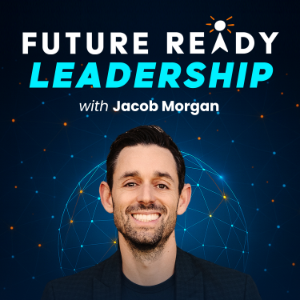
Future Ready Leadership With Jacob Morgan
Business & Economics Podcasts
Are you ready to lead in the future of work? Most leaders aren't! Join 5x best-selling author & futurist Jacob Morgan as he interviews the world's top CEOs, best-selling authors, and leading thinkers to bring you the insights, strategies, and tools you need to become a future ready leader. Guests include CEOs from Best Buy, Netflix, Hyatt, and GE as well as leading thinkers like Seth Godin, Dan Pink, Yuval Harari, and Marshall Goldsmith. This is the world's #1 podcast to lead in the future of work! Watch the videos on Youtube: bit.ly/406fmFP IG: https://www.instagram.com/jacobmorgan8/ LI: http://www.linkedin.com/in/jacobmorgan8 TW: https://twitter.com/jacobm W: https://thefutureorganization.com/
Location:
United States
Description:
Are you ready to lead in the future of work? Most leaders aren't! Join 5x best-selling author & futurist Jacob Morgan as he interviews the world's top CEOs, best-selling authors, and leading thinkers to bring you the insights, strategies, and tools you need to become a future ready leader. Guests include CEOs from Best Buy, Netflix, Hyatt, and GE as well as leading thinkers like Seth Godin, Dan Pink, Yuval Harari, and Marshall Goldsmith. This is the world's #1 podcast to lead in the future of work! Watch the videos on Youtube: bit.ly/406fmFP IG: https://www.instagram.com/jacobmorgan8/ LI: http://www.linkedin.com/in/jacobmorgan8 TW: https://twitter.com/jacobm W: https://thefutureorganization.com/
Twitter:
@jacobm
Language:
English
Contact:
818-4423579
How Top CEOs Stay Relevant, Resilient, and Ready for What's Next with McKinsey's Senior Partner
Duration:00:52:04
The Silent Trust Recession, CEO Automation Hype, and Why AI Is Making Workers Miserable
Duration:00:29:40
Layoff Chaos, AI Irrationality, Gen Z's Double-Major Gamble, and the Global RTO Divide
Duration:00:29:46
AI Adoption Stalls, Ghost Jobs Surge, Gen Z Misunderstood, and New 2026 Work Trends Every Leader Must Know
Duration:00:22:54
CAVA's Chief People Officer on How to Turn Culture Into Action
Duration:00:56:07
Meta's New AI Performance Rules, the Vanishing Career Ladder, and the Hidden Future of Work
Duration:00:35:50
Skilled-Trades Crisis, Musk's Trillion-Dollar Targets, 2026 Workplace Trends, and the Return of College Degrees
Duration:00:27:08
PwC's Workforce Divide, AI Agents at Work, and Amazon's $2.5B Skills Bet
Duration:00:20:38
Why 600 Quit Paramount, Palantir Rejects College, and IT Joins HR to Manage AI
Duration:00:22:16
Uber's Chief Technology Officer Reveals The Secrets To Staying Human Through The AI Change
Duration:00:54:07
AI Layoffs Surge, Italy Regulates Algorithms, and the Real Threat Isn't Job Loss — It's Leadership Loss
Duration:00:25:44
CEOs Tighten Control, Cities Regain Power, and Flexibility Faces Legal Limits
Duration:00:22:59
Walmart's $620K Pay Strategy, Massive Layoffs, Gen Z's Career Crisis, and the Rise of Tech Anxiety
Duration:00:20:12
Palantir's Anti-College Fellowship, KPMG's AI Agents, and the Death of the 9-to-5
Duration:00:18:25
What Every CHRO Must Know About Building a Skill-Based Organization with AI
Duration:00:56:57
AI Replacing Consultants, Gen Z's Leadership Wake-Up Call, and Why Big Tech's $400 Billion Still Isn't Enough
Duration:00:25:29
Experience Is Now a Liability? CEOs Turn Cautious, and AI Takes Over Reviews
Duration:00:20:53
White-Collar Jobs Disappear, AI Targets Middle Managers, JPMorgan Doubles Down on Office Work
Duration:00:13:13
The Corporate Reset: Amazon’s AI Mandate, UPS Job Cuts, Gen Z Reality Check, and the Return of Performance Culture
Duration:00:20:15
CHRO Rob Kowalski On How Novartis Is Reimagining HR With Human-Centered Experiences
Duration:00:53:32
